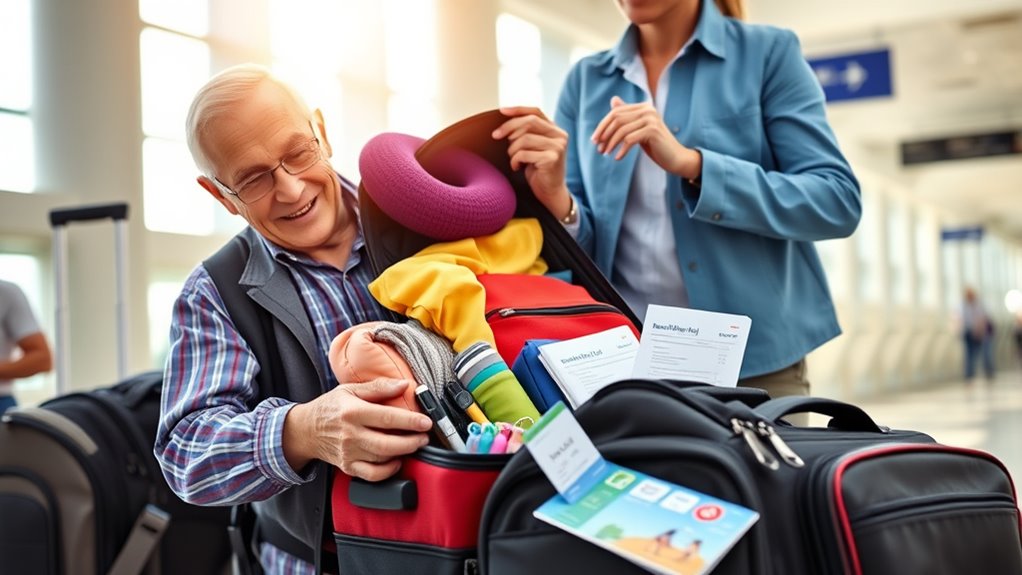Traveling safely and enjoyably in later life involves staying current with vaccinations, planning your trip carefully, and packing essentials like medications and documents. Choose accessible destinations and transportation options suited to your needs, and keep safety in mind by sharing your plans and staying connected. Listen to your body, set realistic expectations, and take breaks as needed. If you’re interested in tips to make your journey smooth and memorable, there’s more to explore below.
Key Takeaways
- Stay current with health vaccinations and carry medical records to prevent illness and handle emergencies abroad.
- Plan transportation and accommodations that are accessible and suitable for mobility needs.
- Keep communication devices charged, share travel plans with trusted contacts, and use safety apps for added security.
- Recognize personal limits, incorporate self-care, and adjust activities to maintain comfort and safety.
- Choose eco-friendly transport options and accommodations to promote sustainable and enjoyable travel experiences.
Prioritize Health and Vaccinations

To enjoy your travels safely, it’s essential to prioritize your health and make sure you’re properly vaccinated. Vaccinations are key to reducing health risks, especially for elderly travelers who may face higher vulnerability. Stay current with immunizations like influenza, COVID-19, pneumonia, and shingles to protect against common illnesses. Consult your healthcare provider at least 4-6 weeks before your trip to identify necessary vaccines based on your destination’s health risks. Carry your vaccination records, and keep them accessible for medical emergencies abroad. Be aware of destination-specific health threats such as yellow fever or polio, and get the appropriate immunizations in advance. Practicing preventive care and health precautions enhances your travel safety, ensuring you enjoy your trip with peace of mind. Additionally, understanding the importance of preventive measures in maintaining your health can help you stay vigilant and proactive during your travels. Regularly reviewing your immunization schedule and updating your vaccines is crucial, especially if you plan extended stays or frequent travel. Incorporating personal health monitoring can further help you detect early signs of illness and respond promptly. Staying informed about health risks in your travel area can further help you prepare effectively.
Prepare and Pack Smartly

Preparing and packing smartly can make a significant difference in ensuring your trip goes smoothly and safely. Start by packing medications in their original containers with labels and carry enough supplies plus extras in your carry-on bag to handle delays. Use lightweight packing organizers to keep everything tidy and label all luggage with your contact info and destination. Make sure to include essential items like comfortable clothing, necessary medical supplies, and travel documents for easy access. Pack versatile clothing suitable for different weather and activities, helping you travel light and avoid unnecessary strain. Create a travel checklist to ensure you don’t forget anything important. Proper luggage labeling and organized packing help prevent mishaps, making your journey more comfortable and secure. Additionally, reviewing your space optimization options can help you pack more efficiently by maximizing available room in your luggage. Considering gold IRA options for future financial security can also provide peace of mind during your travels. Staying informed about privacy policies can help you understand how your data is protected during online bookings and reservations. Being aware of necessary cookies can ensure you maintain essential website functionalities while managing your privacy preferences. Remember that highlighted hair products can help maintain your hair’s vibrancy and health while traveling, ensuring you look your best throughout your journey.
Choose Senior-Friendly Destinations and Transportation

Choosing destinations and transportation options that cater to your mobility needs can greatly enhance your travel experience. Focus on senior-friendly destinations with accessible transportation, such as low-floor buses, reliable taxis, or well-equipped rail systems. Prioritize places with infrastructure designed for ease of navigation, including ramps, elevators, and clear signage. Look for accommodations and transit services offering disability assistance or special needs support for added comfort and safety. Consider destinations with walkable city centers and public transit systems that are simple to use, reducing physical strain. Use the table below for quick ideas:
| Destination Features | Transportation Modes | Accessibility Support |
|---|---|---|
| Walkable city centers | Public transit | Disability assistance |
| Senior-friendly infrastructure | Direct flights, private shuttles | Ramps, elevators |
| Easy navigation | Car rentals with driver | Clear signage |
Additionally, selecting accessible transportation options can significantly improve your overall travel comfort and safety. For example, choosing senior-friendly infrastructure can reduce the physical effort required during travel, making the journey more enjoyable. Incorporating data-driven strategies when planning your trip can help identify the most suitable destinations and transit options tailored to your needs. Being aware of local accessibility standards can also help you choose destinations that meet your specific requirements. Moreover, staying informed about family-centered amenities at your destination can ensure a comfortable and enjoyable experience for all travelers.
Maintain Safety and Connectivity During Travel

Maintaining safety and staying connected while traveling requires proactive steps to guarantee peace of mind. Stay connected by carrying a fully charged mobile phone with an international plan or SIM card to assure seamless communication abroad. Save important documents, including your passport, travel insurance that covers emergencies, and contact details for local hospitals and your embassy. Share your itinerary and accommodation info with trusted family or friends, and use location-sharing features for added safety. Regular maintenance of your phone’s software and apps guarantees they’re up-to-date and functional. Staying informed about local safety tips can further enhance your security during travel. Staying alert to emotional readiness, especially after significant life changes, can help you better manage unforeseen situations. Staying hydrated to keep your energy up and use social media or safety apps with GPS tracking and emergency alerts. Regularly reviewing your travel health precautions ensures you’re prepared for any health-related issues that may arise. Being aware of personal safety strategies, such as avoiding risky areas and trusting your instincts, can significantly reduce potential dangers. Also, understanding the importance of nutritional benefits of raw food can help you make healthier choices if raw foods are part of your diet while traveling. Consistent check-ins with someone at home keep you connected and alert them to your well-being.
Manage Expectations and Listen to Your Body

Since travel can be physically demanding, it’s important to manage your expectations and listen to your body throughout your trip. Recognize your limits by evaluating your stamina and mobility, and plan activities that suit your energy levels. Incorporating protective styling benefits into your travel routine can help reduce stress on your hair and make styling easier during your trip. Listening to your body’s signals, like pain or dizziness, and taking rest breaks or adjusting your plans are essential to stay comfortable and safe. Practice self-care by staying hydrated, eating well, and scheduling downtime to prevent fatigue and maintain your health. Being aware of electric bike capabilities can also help you choose suitable transportation options that match your physical condition. Considering energy-efficient options like ground source heat pumps can contribute to a more sustainable and cost-effective trip, especially if you’re staying in eco-friendly accommodations. Additionally, understanding health and safety guidelines for travelers can ensure you’re well-prepared for unforeseen circumstances. Staying informed about personal safety tips can further enhance your confidence and security during your travels. Be flexible with your itinerary, allowing room for unexpected needs or changes. Clear communication with travel companions or guides can also help ensure support.
Frequently Asked Questions
At What Age Do Most Seniors Stop Traveling?
Most seniors stop traveling around age 85 or older, although many continue into their late 70s and early 80s. Your decision to keep traveling depends on your health, mobility, and comfort, not just age.
While some may face challenges that limit their trips, others find ways to stay active and explore.
Ultimately, it’s a personal choice influenced by your individual circumstances and support system.
Have an Enjoyable and Safe Trip?
To have an enjoyable and safe trip, you should plan ahead by researching your destination for accessible options and senior-friendly amenities.
Share your itinerary and emergency contacts with loved ones, pack essentials like medications and important documents, and use secure accessories for valuables.
Stay aware of your surroundings, trust your instincts, and choose activities suited to your physical capabilities.
This way, you’ll maximize fun while minimizing risks.
Which Country Is Best for Senior Citizens to Visit?
When choosing the best country for senior citizens to visit, consider what matters most to you—culture, safety, or outdoor activities.
Countries like Portugal, Spain, and Greece offer rich history and mild climates.
Japan provides excellent healthcare and safety.
Scandinavian countries excel in accessibility and public services.
New Zealand and Australia feature scenic landscapes and outdoor adventures.
Pick a destination that aligns with your interests and comfort needs for an enjoyable trip.
What Is the Senior Travel Age?
The senior travel age isn’t set in stone; it varies based on your health and mobility. Typically, people start considering themselves seniors around 55 to 60, with many discounts available from age 60 or 65.
But it’s more about your individual readiness than a specific number. You can travel comfortably whenever you feel ready, regardless of your exact age, making your journey enjoyable and safe at any stage.
Conclusion
Traveling in later life offers freedom and adventure, like opening a new chapter of discovery. While you embrace new sights and sounds, don’t forget to prioritize your health and safety. Just as a gentle breeze can refresh your day, staying connected and listening to your body keeps your journey smooth. Balance excitement with caution, and every trip becomes a cherished memory—proof that adventure truly knows no age.









